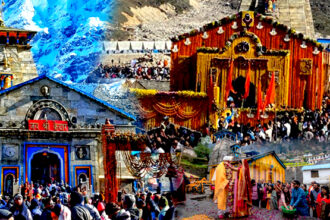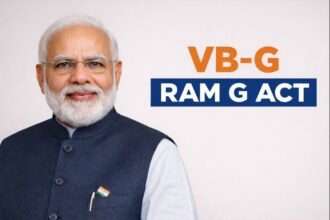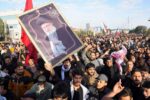There are two ways in which Union Minister Ram Nath Thakur views the political and social legacy of transformation in his home state Bihar. First, through the perspective of recent history and present context, and second, through the point of view of leadership that is shaped by and dedicated to the needs of the people. It is for this reason, perhaps, that when he talks about the transformation brought in Bihar, he does not look at it in seclusion — from human aspects that make good change possible. Transformation in people’s lives in politics, according to him, has been made possible by leaders “who listen”, observe and absorb, the needs of people.
He has witnessed “transformation” in the political and social landscape of Bihar through two immersive domains – of home and public life. As son of Bharat Ratna Jan Nayak Karpoori Thakur, one of the most valued and well-known socialist icons of Bihar, he is experiencing the public perspective on “transformation” in the midst of NDA’s election campaign with oodles of reference to Bihar’s good past, not so good past, and present. Between back-to-back meetings being held in support of NDA candidates in his state, particularly those happening in and around Samastipur, he experiences the impact of positive qualities of NDA leadership on the ground.
Defeating Bihar politics ‘ailments’ with empathy, respect, security
As a senior leader of the NDA in Bihar, it is natural for him to be often referred to – by people and politicians – in the context of his father. However, four names that Thakur’s own interaction revolves around are “Jayaprakash Narayan”, “Nitish Kumar”, “PM Narendra Modi”, “Amit Shah”. Thakur believes that it is a blend of empathy and respect for people in the work and politics of these four leaders, among several others, that has enabled Bihar’s transformation — towards social justice, development, and becoming Naxal-violence free. He believes that it has enabled the NDA to deliver several welfare schemes promised to people, and made possible for Bihar to become “free of diseases and ailments” in politics and governance. He spoke to this author.
Thakur draws a parallel – promptly. He says, “Take the instance of the 1970s. During Lok Nayak Jayaprakash Narayan’s time, the biggest dacoits were in Chambal. How far would they stay away from their families and for long? How desperate were they? He heard them and he gave these people the opportunity to reform. The Chambal Valley’s problems ended, and CM Nitish Kumar, PM Modi and Amit Shah, who promised to eliminate Naxalism, are working to resolve these problems, and Naxalites are surrendering and entering the mainstream. This is a significant achievement and Bihar has watched it.”
Thakur is Member of Parliament in the Rajya Sabha from Bihar. A leader from the JD(U), he became Union Minister of State for Agriculture and Farmers Welfare in 2024.
Bihar suffered immensely owing to Naxalite movement and violence – for decades. The NDA government’s fight against Naxalism, in Thakur’s own perspective, became possible because CM Nitish Kumar, and PM Narendra Modi, prioritised giving respect to people who were in despair due to Naxalism.
“Loag nirash thhe, niraash ho kar ke, hataash ho kar ke, Naxal movement ki taraf gaye, hinsa ki taraf chale gaye (People were frustrated, and in their despair, they turned to the Naxalite movement, to violence). Today, the Centre and the state government have given so much respect to the needs of the people, that people who were involved in Naxalite activities are leaving that path and joining the mainstream,” he says.
Thakur is well known for his stance on why socialists and freedom fighters, based on their thought and actions, parted ways with the Congress. In December 2024, Thakur spoke in the Rajya Sabha on how the students’ movement of 1974 (the Navnirman Andolan of Gujarat) resonated with tall leaders such as Morarji Desai and Loknayak Jayaprakash Narayan. He has raised questions in Parliament, compelling reflections on why leaders such as Dr Ram Manohar Lohia and others, left the Congress.
Transformation through ‘sushaasan’ – the focus and legacy
While sections of the media are indicating BJP’s inevitable bend towards the “mandal-kamandal” politics amid PM Modi’s tribute to Jan Nayak Karpoori Thakur, Ram Nath Thakur is focussing on the transformation brought by Bihar in development and “sushasan” (good governance) brought by the NDA government in Bihar, in his campaign for the assembly election.
Prime Minister Narendra Modi held a rally in Samastipur on October 24. This was his first rally in Bihar after the announcements of polling dates. It carries deep symbolism as it addresses several aspects of NDA’s continuing work for the backward classes, poor and their welfare. Addressing voters in the home district of Jan Nayak Karpoori Thakur during his visit to Karpurigram, the birthplace of the leader, PM Modi invoked his work towards social justice and the well-being of people. The message intended for the ground is that the “backward and poor background” are facets common in Jan Nayak Karpoori Thakur, CM Nitish Kumar and PM Modi.
Efforts to strengthen connections with the people of Bihar through the socio-cultural outreach centred on Jan Nayak Karpoori Thakur are of political significance of the BJP, as his appeal cuts across the different generations, including the youth. The highlight in PM Modi’s campaign for the NDA is that his interaction with the BJP workers in Bihar has taken place during the same week as his visit to Karpurigram. The close proximity of the two events is expected to be effective in boosting the morale of the BJP cadre around and before the Chhat Puja celebrations, and their connection with the people.
The assertion of identity in the backwards sections of the Bihari society through a personal tribute in PM Modi’s outreach is expected to deliver a message of continuing Thakur’s legacy, to the youth of Mithilanchal, particularly those from the backward groups. PM Modi-led NDA government honoured Jan Nayak Karpoori Thakur with the Bharat Ratna in 2024, amid the claims of other parties in Bihar to Thakur’s legacy in the wake of Lok Sabha 2024. While different sections of the NDA’s opposition have criticised the BJP for “ignoring” the legacy of Karpoori Thakur and the Sangh-aligned sections for playing a part in the decline of Thakur’s government, the BJP and the NDA have gone ahead with making energetic assertions of honouring the efforts of Jan Nayak, his social identity, legacy, and cultural impact on Bihar.
‘PM Modi honoured Jan Nayak’s contribution, others delayed it’
Union Minister Ramnath Thakur cuts through the noise directed at the NDA. Moreover, his words indicate that he is focussed on the present and not the past. He says, “Jan Nayak Karpoori Thakur ko Bharat Ratna Narendra Modi hee ne diya, Congress ne nahin na diya, ya kisee aur party ne nahin na diya (Bharat Ratna was given to Jananayak Karpoori Thakur by Narendra Modi only, not by Congress or any other party.)”
He believes that Bihar is ready to deliver the right message under the leadership of CM Nitish Kumar, PM Narendra Modi and the NDA government. “PM Modi’s gestures of honour have relayed a message to the people of Bihar. Public meetings have been held. The people of Samastipur and Bihar at large see this as a gesture towards encouraging and encouragement.” Thakur points to the delay shown by other parties in delivering the honour to one of the tallest leaders of Bihar.
“Thakurji, 1952 se jab tak unki aankh moond li, tab tak wo vidhayak rahe. He was CM deputy CM, and the leader of opposition. In 34 years after his passing away, the Congress neither honoured him with Bharat Ratna, nor any other recognition. On the other hand, PM Modi has given the Bharat Ratna to not only Karpoori Thakur ji but also to Chaudhary Charan Singh and MS Swaminathan for their great contributions in the field of agriculture and service to the nation.”
On Congress spokesperson Jairam Ramesh posting a series of questions on X before PM Modi’s visit to Karpurigram, Thakur says, “The Modi government has honoured BR Ambedkar in his ancestral village. What does the Congress government see as ‘wrong’ in all these steps taken by the NDA government under the leadership of PM Modi?”
‘Mahagathbandhan campaign will be proven ineffective’
Thakur claims that the campaign of the Congress and the Mahagathbandhan will be proven ineffective by the people of Bihar, signs of which, according to him, have been visible in Bihar, after the rallies in their ‘Voter Adhikar Yatra’. “Rahul Gandhi and Tejasvi Yadav took out rallies in Bihar on the issue of SIR. Khoob shor sharaba hua thha, chunav aayog par aarop lagey (there was a lot of chatter and noise and accusations made on the election commission). Even before the dates for the election were revealed, they (Gandhi and Tejaswi Yadav) came to Bihar, they stayed at a posh hotel in Patna, they travelled from airport to the hotel, and took out rallies on the roads of Bihar. The issues they claimed to fight…amid all this, the people of Bihar did not show any sign of protest against the election commission.”
Thakur claims that accusations levelled by leaders of the Mahagathbandhan had no effect on the people of Bihar and the rally or its cause did not resonate with voters. He says, “There were no protest flags against the ECl. The ECI officials were neither stopped anywhere in Patna. Their movement was not hindered by the people of
Bihar. Meetings between officials of the ECI and representatives of political parties went off peacefully. The two leaders and issues raised by them point to a disconnect.”
He lists the factors that he believes will work for the NDA in the Bihar Vidhan Sabha poll:
One: Work done by Bihar CM Nitish Kumar from 2005 to 2025. This includes taking initiatives that reflect Kumar’s sensitivity for the people of Bihar and their needs.
Two: According to Thakur, Kumar has addressed the problems and pains of people and addressed the disease in politics — which was affecting life across the state prior to his years as chief minister, across issues, such as the need for roads and connectivity, the need for schools, electricity, law and order, health and other areas vital to governance.
Three: The NDA government’s work towards women-centred policies and encouraging them to take up livelihood opportunities. And Kumar’s dialogue with the women of Bihar.
Four: He mentions that Kumar increased pensions under social security schemes for elderly citizens, disabled people, and widows in the state. It will play a vital role in the election.
Five: The announcement of providing free electricity up to 125 units to people in the state, and the reach of this announcement. Other initiatives taken by the NDA governments towards welfare of poor families at the domestic front.
Six: Thakur asserts that Kumar’s work is hugely-appreciated in Bihar. “This has increased the prospects of the NDA in the 2025 polls. He is the chief minister and he will remain chief minister.”
Thakur told this author that former prime ministers Indira Gandhi, Lal Bahadur Shastri, Chaudhary Charan Singh, Narasimha Rao Atal Bihari Vajpayee, Chandra Shekhar, are all known for their people-centric work, but the work of PM Narendra Modi for the people of Bharat and Bihar, particularly his policies on agriculture and the deep interest shown by him in improving farming conditions, improving the yield and addressing issues related to agriculture, establish a different league and set him apart.
“PM Modi listens to the problems and issues related to the field, soil and crop. We were present with him. He dedicated 35 minutes to simply listening to the problems related to growing bajra, in looking for solutions for better yield of bajra and paddy in the state, and thirdly — in the growing of vegetables, and horticulture in lesser time than before his interventions came in,” he adds.
According to Thakur, the farmer is getting a better supply of electricity, tractors and equipment, on lesser costs, is helping bring improvements. “Gareeb kisaan ko kaise aage badhaya ja sakta hai wo krishi vibhag ne kiya hai. Krishi vibhag ke dwara bahut kaam hua hai (the Agriculture Department has worked to advance the lives of poor farmers. A lot of work has been done by the Agriculture Department). Natural disasters, such as floods have caused problems for farmers and hence some of them are unhappy. But as far as the work done by the government, they are satisfied.”
During his rallies in Bihar, Home Minister Amit Shah has referred to the five parties of the NDA as the “paanch Pandavs“. Rallies held by Rakshamantri Rajnath Singh and Shah have clearly established BJP’s pitch of fighting against the “jungle raj”. The two senior leaders mentioned the work done by the NDA for Bihar’s development. Thakur is relaying the same tone and tenor. Thakur refers to a set of problems that have persisted in Bihar politics owing to “misgovernance” – as “ailments”. Among them is lack of political empathy for the poor and backward – which, he believes, became the basis for their neglect and problems faced by Bihar. Thanks to parties and politicians that did not “listen”.








